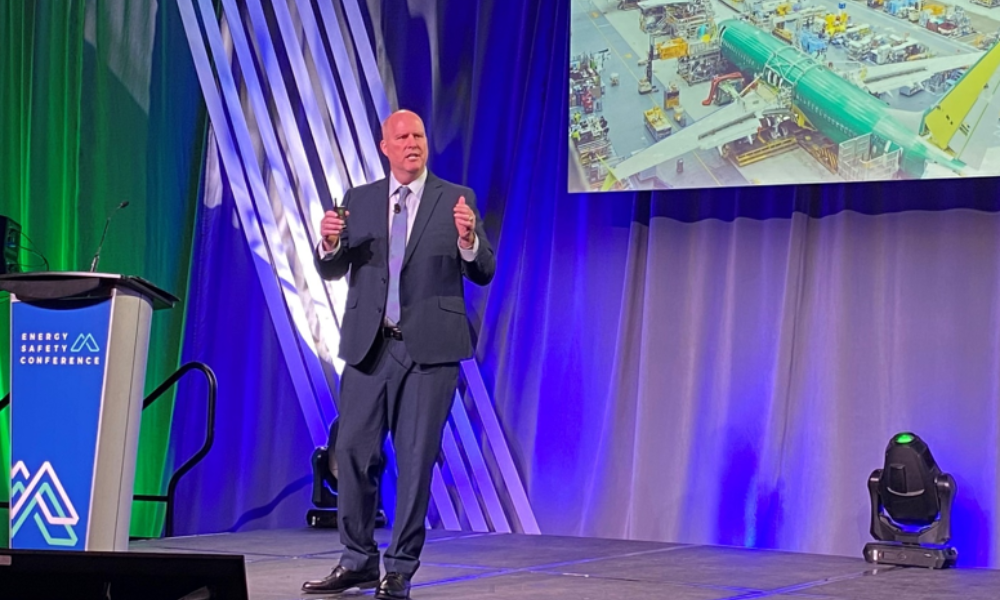'The safety of these planes is something I can no longer vouch for,' says Ed Pierson

In the closing keynote address at the Energy Safety Conference in Banff, Alberta last week, Ed Pierson, a former senior manager at Boeing and now a vocal whistleblower, issued a stark warning about ongoing safety issues with Boeing Max airplanes. Pierson’s current advocacy work, centered around a forthcoming press release from his foundation, is expected to demand the immediate grounding of all Max models due to unresolved safety risks.
"The safety of these planes is something I can no longer vouch for," Pierson declared, setting a grim tone for his presentation which delved deep into systemic failures at Boeing and within American regulatory oversight bodies. His insights are particularly relevant for Canadian occupational health and safety professionals as they underscore the critical need for stringent oversight and accountability in safety-critical industries.
Pierson recounted his harrowing experiences at Boeing’s 737 Factory in Renton, Washington, where he observed a "dangerously unstable production environment" plagued by overworked employees, chronic part shortages, and unrelenting schedule pressure. These conditions, he argues, directly contributed to the tragic crashes of two Boeing Max planes and another mid-air emergency.
Lion Air Flight 610 crashed in the Java Sea in October 2018 killing 189 people. Ethiopian Airlines Flight 302 crashed six minutes after takeoff in March 2019 killing 157 people. Earlier this year, an Alaska Airlines flight saw a portion of the fuselage blowout mid-flight, leaving a gaping hole in the side of the plane.
"I saw firsthand the breakdown from high-quality safety standards to a culture of rushing and cutting corners just to meet delivery deadlines," Pierson explained, emphasizing the catastrophic consequences of such shifts in priorities. His calls for a shutdown of production to address these issues were repeatedly ignored, both before and after the fatal accidents.
Throughout his presentation, Pierson detailed his extensive efforts to alert Boeing’s upper management and federal regulators to these dangers. His frustration was palpable as he spoke of the systemic inertia and resistance he encountered: "Despite clear evidence of significant risks, there was a consistent downplay or outright dismissal of safety concerns."
His insights into the normalization of deviancy within Boeing paint a chilling picture of how safety can become secondary to commercial interests, a message he shared with the U.S. congress during testimony as part of its investigation. It’s also a cautionary tale for all sectors where occupational health and safety are paramount.
"The culture of silence and retaliation against whistleblowers creates an environment where it's risky to speak up, yet it's even riskier not to," proclaimed Pierson. His ongoing mission to advocate for transparency and reform was met with keen interest from the conference attendees, many of whom are involved in enforcing or overseeing workplace safety standards in Canada.
As Canadian professionals dedicated to occupational health and safety, the lessons from Pierson's experience are clear: vigilance, relentless advocacy for safety, and a proactive approach to regulatory compliance are non-negotiable. His call to ground the Max planes until they are proven safe is not just a demand for action but a plea for prioritizing human lives over profit.
Pierson's closing remarks resonated deeply with the audience, "We have to have these frank, honest, direct conversations about safety. It’s not just about compliance, it’s about ethical responsibility and ensuring that tragedies like those involving the Max planes never happen again."
His story serves as a powerful reminder of the role safety professionals play in not just adhering to standards, but in actively shaping safer industrial practices. As Pierson continues to push for change, his message underscores the critical importance of robust safety cultures—a message that Canadian safety professionals will find both relevant and urgent.
Pierson, meanwhile, won’t fly on a Boeing Max plane, with his organization, The Foundation for Aviation Safety, planning to make a public call later this year to ground the planes.





